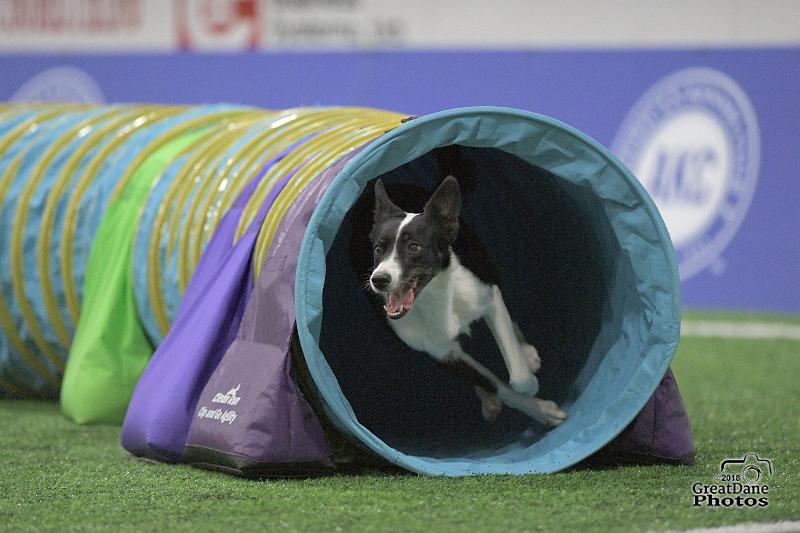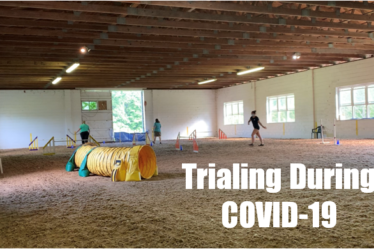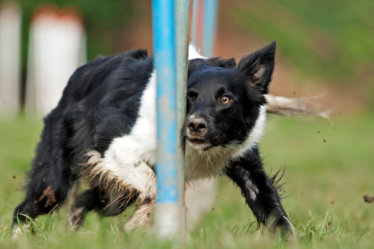
Introduction to Emotional Agility
Emotions are a part of the journey for every handler. From moments in the ring that thrill you to training conundrums that leave you confused, the emotions you feel in any given moment inform your mind and body of what to do next.
Being aware of your emotional reactions can help you better navigate your emotional experience and help you do the next best thing possible, whatever that may be in the present moment.
In psychology, your ability to experience and process emotions in a way that allows you to meet your needs and adapt to the situation is known as “Emotional Agility”.
When people are driven by their emotions they react to a situation.
For example, when someone cracks a joke, you’re amused and react with laughter. The appropriate emotional response to the situation is followed with beneficial behavior, in this case, laughing. Yay, the brain did a good job responding.
Unfortunately, your mind isn’t always the best at pairing an appropriate or beneficial response to every situation, sensation or thought you have. When cut off in traffic an angry driver can quickly feel intense emotions of rage, the thoughts and actions that follow are likely impaired by this intense emotional reaction.
This emotional reaction does not help meet the needs of this individual OR help them adapt to the situation. In fact, this driver’s likely thinking or acting in a way that intensifies their unpleasant emotions further, such as verbalizing that they “hate” the other driver or screaming profanities.
However, the feelings that well up inside of you do not have to dictate your thoughts and actions. By becoming aware of your emotional experience you’ll be better able to respond to a situation, sensation or thought appropriately. A momentarily pissed off driver that’s practiced emotional awareness can shift their emotional response from enraged to calm, thankful, relieved or any pleasant feeling that would best support them in that moment.
The same is true for handlers in training, competition and beyond. The ability to respond rather than react enhances resilience after mistakes, reduces stress, improves decision making and a host of other benefits for your performance in the ring and personal life.
Becoming Aware of Your Emotions
While it can be easy to lump your emotional experience under broad terms like happy, sad or angry, these base level emotions don’t provide enough depth to articulate your experience. By exploring and using different sub-categories of emotions to describe your feelings in the moment, you’ll be better able to choose actions and thoughts that shift your emotional response.
Your emotions may vary in their complexity, such as experiencing the combination of excitement and anxiousness on your first trip to nationals. Your emotions can also range in their intensity. A vague feeling of annoyance after overhearing a comment from the crowd is a different experience than feeling animosity towards someone for making a blatantly offensive statement about your dog.
The complexity and intensity of your emotional experience can make it difficult in the moment to manage your response to what is happening. Consistently drawing awareness to these aspects allows you to reassess if the complexity of your emotions and the intensity of your emotions are beneficial for you in the moment.
Additionally, you’ll want to pay attention to non-feeling words that can be used to make sense of a situation, sensation or thought that are not representative of your emotional response.
For example, a handler may say they feel bad after their handling performance in the ring. While you can phrase this as “I feel bad” this is an evaluation of your performance, rather than an accurate description of your emotions.
Often people assess a situation by evaluating or judging their behaviors or the behavior of those around them, rather than assessing how those behaviors made them feel. This can often be a barrier when trying to shift out of one emotional state to another, as the evaluation is likely not amendable to change. You can’t make a “bad” performance “good”. However, you can take actions or use certain thought processes to change your emotions from stressed to curious OR heartbroken to grateful in response to that experience.
Now not every event, experience or thought will elicit an emotional response from you. Watching your dog sniff a blade of grass or the sensation of taking a gulp of water probably won’t leave you feeling one way or another. Reading a thread of comments online about border collie breeders, that’s another whole story.
You may feel irritated or frustrated by one comment. In the same thread, comments about your breeder’s lines may leave you feeling secure in your decisions or curious to learn more.
Awareness of your emotions is not only about knowing what emotion you’re experiencing in the moment, but also why that emotion arose in that moment and whether it is beneficial to your wellbeing and your goals.
Awareness of your emotions requires you to practice non-judgement towards your emotional experience. Often, we start making judgements or having feelings about our feelings (also known as, meta emotions).
That was a total disaster, I am so embarrassed. Ugh. It is stupid to be sad about it, it’s just a game with my dog. But, I feel totally humiliated and uncomfortable going back to the building. What’s wrong with me? I should just get over it and be happy.
In an instant, the judgement placed on oneself for feeling the “wrong” emotion digs the hole much, much deeper than it needed to be.
Experiencing an unpleasant emotion is not wrong, stupid, bad or anything else.
All of your emotions, pleasant and unpleasant, are an important part of your journey in this sport and in life. The goal isn’t to eliminate unpleasant emotions or to only feel pleasant emotions, but to have compassion for your everchanging emotional experience.
Shaming yourself for feeling a certain way leads to suppression of your emotions OR avoidance of situations that make you feel unpleasant emotions. Unpleasant emotions, like anxiousness, frustration, discomfort, or confusion, are necessary for you to learn, grow and develop. You can’t reach your goals without them!
To start developing your own emotional agility, practice awareness of your emotions and begin making choices that help you feel or think in ways that support your goals and uphold your personal values.



